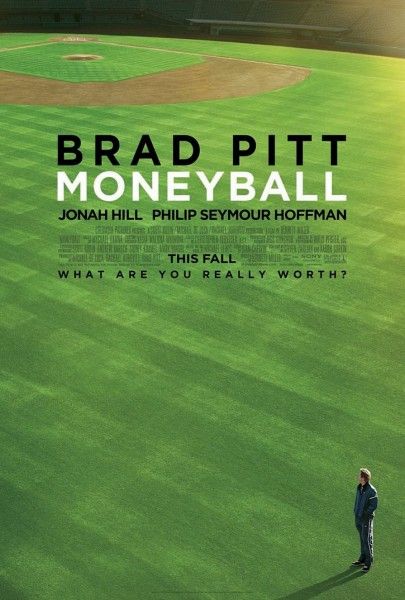[This review is a re-print of my review from the 2011 Toronto International Film Festival]
The joy one gets from going to a baseball game is an intangible. You can keep the foul ball you caught in the stands or the souvenir cap you got at the gate, but there's no quantifying the thrill of seeing a walk-off home-run or watching a player make a diving catch or seeing a pitcher strike out the batter with bases loaded. Oakland Athletics general manager Billy Beane (played by Brad Pitt) presented an anathema to the intangible by trying to quantify every play and every player. The uproar against his plan was tremendous and oblivious. The game had already been quantified in dollars, and the A's didn't have much of those. What they did have was a willingness to rethink an unfair business to so they could have a shot at the championship. Bennett Miller's adaptation of Michael Lewis' Moneyball takes the interesting ideas presented in the book and transforms them into a funny, dramatic, and captivating tale that can hold competing ideas simultaneously.
In 2001, the A's reached the American League Division Series but were defeated by the New York Yankees. The A's had a payroll of $38 million to New York's $114 million. The A's also had star players Jason Giambi, Johnny Damon, and Jason Isringhausen, all of who went into free agency at the end of the season and would garner a price tag out of the Atheletics' budget. Unable to get more money and desperate to win, Beane discovers Yale economics graduate Peter Brandt (Jonah Hill) and learns that every team in baseball is wasting their cash. Too much has been placed on intangibles like looks, a good swing, and deceptive statistics like runs-batted-in and even home runs. On-Base Percentage is everything because runs generate wins and wins are everything.
Unable to compete under conventional means and with nothing to lose except his job and his reputation, Beane takes a chance on statistics-based-baseball (popularly known as Sabermetrics). Beane also has a personal reason in this radical concept since he was a former baseball prodigy who looked like a hall-of-famer and instead flamed out. Given a false sense of his own worth, Beane wants to see value on paper and never again fall for the same deceptions. As Beane and Brandt's new strategy struggles in the face of opposition from manager Art Howe (Philip Seymour Hoffman), skeptical scouts, and the ire of every single sports pundit, the two risk everything on players who have tweaked nerves, funny pitch delivery, and old legs.
Moneyball skillfully plays with the question of how baseball can remain fun if it's boiled down to a science. If everything is just a statistic, and the statistics celebrating walks while ruling out staples like base-stealing and bunting, then how much is left for us to enjoy? Doesn't science remove the poetry of a game when a batter's stance and poise is irrelevant when compared to how many walks he draws? Those questions may bother a fan, but Billy Beane needs to win not just for his career but to change the game in way he never could as a player. Moneyball is a sports underdog story presented in a more thoughtful manner than simply "Must win championship."
Miller does a tremendous job taking complicated ideas and delivers them in an easily-accessible drama. Steve Zaillian and Aaron Sorkin's script distills the ideas and bullet points of Lewis' book and turns them into charming quips and shorthand that will work for baseball fans and non-fans alike. More impressive is that Miller doesn't rely on graphics or playful visual aids to explain the stats and why they matter. Sharp, succinct dialogue and some close-ups on computer monitors is all he needs to make his point. There's enough confidence in the story, the themes, the humor, and the performances that big visual flourishes like numbers running across the screen or expensive animated graphics are unnecessary. Moneyball is only frustrating when it betrays its self-assured tone and drags in the middle when the story drives home the point that the baseball establishment thinks Beane is a lunatic, and a cloying relationship between Beane and his daughter where she writes him a song to cheer him up. It certainly doesn't need a character at the end summing up the result of Beane's experiment.
But these shortcomings aren't to the greater detriment of the picture. Moneyball keeps cool even when it comes to its complicated climax and the A's are going for the longest winning-streak in major league history. It's an unexpected crystallization of how statistics don't kill our enjoyment of baseball. If Beane and Brandt were truly heartless stat-hounds, the streak would be meaningless to them as would a championship beyond increased revenues to buy more players. Beane may be able to fool himself that he doesn't care about championship rings or win-streaks or anything beyond proving his point, but he's as excited as the rest of us when he watches Scott Hatteberg (Chris Pratt), a washed-up catcher turned first basemen that every other team had given up on, comes to the plate.
Science may beat out superstition but that doesn't mean it destroys awe or excitement. Sure, "Casey at the Bat" would lose some of its poetic power if "Mighty Casey has struck out" was changed to "Mighty Casey struck out because he didn't realize he was statistically more likely to hit pitches that were up-and-in than down-and-away." But intangibles can't be destroyed by statistics. Does an Athletics fan feel less joy if a game-winning home run comes off the bat of Scott Hatteberg rather than a Jason Giambi? Is a strikeout any less of a victory if it comes off the arm of Chad Bradford rather than Jason Isringhausen? Science doesn't remove mystique and it doesn't diminish a victory. It just means you don't write off a hitter if he has an unattractive girlfriend and you certainly don't write off Moneyball because you think you don't like sports movies. It's much more than another underdog story (although I don't have the stats to prove it).
Rating: B





